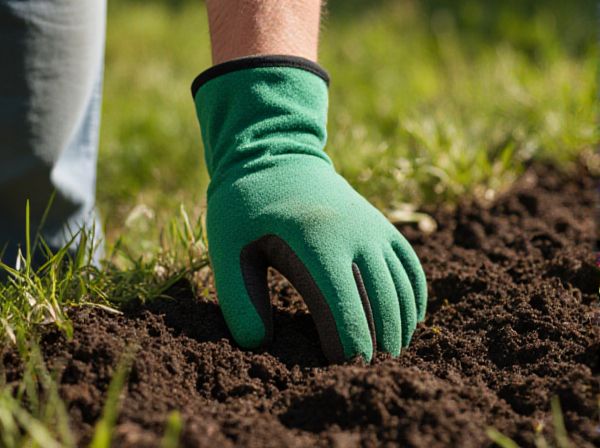
mulching vs rock gardens Illustration
Mulching enhances soil moisture retention and improves nutrient content, promoting healthier plant growth in ornamental gardens. Rock gardens offer a low-maintenance, drought-resistant alternative with unique aesthetic appeal but require careful plant selection to thrive. Choosing between mulching and rock gardens depends on desired garden style, maintenance levels, and environmental conditions.
Table of Comparison
| Feature | Mulching | Rock Gardens |
|---|---|---|
| Material | Organic materials like bark, wood chips | Rocks, stones, gravel |
| Maintenance | Requires periodic replenishing and monitoring | Low maintenance, occasional cleaning |
| Weed Control | Effective as a natural weed barrier | Highly effective at preventing weed growth |
| Water Retention | Enhances soil moisture retention | Does not retain soil moisture |
| Durability | Decomposes over time; needs replacement | Long-lasting, durable landscape option |
| Cost | Generally lower initial cost | Higher upfront cost due to materials |
| Environmental Impact | Biodegradable and environmentally friendly | Inorganic; minimal environmental benefits |
| Aesthetic Appeal | Natural, soft look complementing plants | Modern, clean, and structural appearance |
Understanding Mulching: Benefits and Drawbacks
Mulching enhances soil moisture retention, suppresses weeds, and improves soil fertility by decomposing organic matter, making it an essential practice for ornamental gardens. However, excessive mulching can lead to root rot and attract pests, requiring careful application and maintenance. Compared to rock gardens, mulching offers dynamic nutrient cycling but demands more frequent upkeep to maintain optimal plant health.
What Defines a Rock Garden? Key Features
A rock garden is defined by its strategic use of stones, gravel, and well-drained soil to create a naturalistic, low-maintenance landscape that mimics alpine or arid environments. Key features include drought-tolerant plants like succulents and alpine species, arranged among carefully placed rocks that provide both structural interest and microclimates for growth. Unlike traditional mulching, rock gardens prioritize stone materials over organic matter to reduce moisture retention and prevent weed growth, enhancing longevity and aesthetic appeal in ornamental gardening.
Aesthetic Appeal: Mulch vs. Rock in Ornamental Gardens
Mulching enhances ornamental gardens with rich, natural textures and vibrant colors, creating a soft, organic backdrop that complements plant foliage and flowers. Rock gardens offer a durable, low-maintenance aesthetic with varied shapes and muted tones that highlight structural design and drought-tolerant plants. Both methods provide distinct visual appeals, influencing garden style and ambiance based on texture, color contrast, and maintenance preferences.
Soil Health Impact: Organic Mulch Compared to Stones
Organic mulch enriches soil health by decomposing and adding essential nutrients, improving microbial activity and moisture retention. In contrast, rock gardens offer minimal benefits to soil fertility, often leading to poor nutrient cycling and reduced microbial diversity. Over time, organic mulching supports robust plant growth through enhanced soil structure, unlike the inert nature of stones which may inhibit healthy root development.
Water Conservation: Which Method Performs Better?
Mulching significantly outperforms rock gardens in water conservation by maintaining soil moisture and reducing evaporation rates, promoting healthier plant growth. Organic mulches decompose to enrich soil, improving water retention and reducing irrigation needs compared to the minimal absorption of rocks. Rock gardens, while low maintenance, often increase runoff and heat absorption, leading to higher water loss and less efficient moisture conservation.
Weed Suppression: Mulch or Rocks for Cleaner Beds?
Mulching provides superior weed suppression by creating a thick, organic barrier that smothers weed seeds and retains soil moisture, enhancing plant health. In contrast, rock gardens, while low maintenance and decorative, often allow weed growth through gaps and require periodic manual removal or herbicide use. For cleaner beds, organic mulch consistently outperforms rocks in limiting weed proliferation and promoting a tidy, healthy ornamental landscape.
Maintenance Requirements: Long-Term Care Differences
Mulching in ornamental gardens requires regular replenishment and monitoring to maintain soil moisture and prevent weed growth, typically every 1-2 years depending on material type. Rock gardens demand less frequent maintenance, mainly occasional weeding and cleaning of debris, with rocks providing durable ground cover that minimizes soil erosion. Over time, mulching supports soil health and fertility, while rock gardens emphasize low-maintenance aesthetics but may need periodic adjustments to prevent plant crowding or rock displacement.
Cost Comparison: Upfront and Ongoing Expenses
Mulching offers a lower upfront cost, with materials like bark or wood chips priced between $30 to $60 per cubic yard, while rock gardens demand a higher initial investment, often ranging from $200 to $500 per ton for decorative stones. Ongoing expenses for mulch include annual replenishment due to decomposition and weathering, typically costing $100 to $200 per year, whereas rock gardens require minimal maintenance, reducing long-term expenses significantly. The cost efficiency of mulching is appealing for budget-conscious gardeners, but rock gardens provide a durable, low-maintenance option that justifies the higher initial outlay over time.
Plant Compatibility: Choosing the Right Option for Ornamentals
Mulching enhances soil moisture retention and nutrient availability, promoting healthier growth for a wide range of ornamental plants, especially those requiring rich, well-drained soil. Rock gardens are ideal for drought-tolerant and alpine ornamentals that thrive in well-aerated, low-moisture environments with minimal organic matter. Selecting the right option depends on the specific water, soil, and root aeration needs of the ornamental species to ensure optimal plant compatibility and aesthetic appeal.
Climate Considerations: Best Choice for Your Region
Mulching excels in humid climates by retaining soil moisture and regulating temperature, promoting healthy plant growth. Rock gardens suit arid or drought-prone regions, offering low maintenance and preventing soil erosion. Selecting between mulch and rock depends on local climate factors like precipitation, temperature extremes, and soil drainage characteristics.
mulching vs rock gardens Infographic

 gardendif.com
gardendif.com